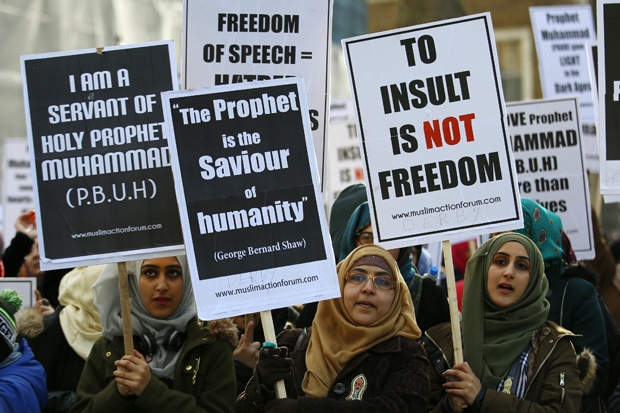A few days ago Imtiaz, a solar engineer; Aliya, a campaigner for secular education; Sohail, a gay Somali in his twenties; and Sara, a bright student, went to Queen Mary University of London in the East End and made an astonishingly brave stand.
Astonishing because they volunteered to step forward to the front line after the Islamist murders of satirists and Jews in Paris and Copenhagen. Before an audience and in front of cameras, they explained why they had left Islam. They had become ‘apostates’, to use a dangerous word, which blackens what ought to be a personal decision that free adults in free countries ought to be free to make without anyone threatening them. In the mouths of theocrats, ‘apostasy’ turns individual rights to freedom of conscience into a sin and a betrayal.
The ex-Muslims knew all about the costs of challenging the taboos of their families. Sara was sparkling and funny, but her voice cracked when she described how her parents ‘chose religion over me’, and how the last words she remembered her sister saying were to wish that she were dead.
Any child who breaks away from a devoutly or fanatically religious background or a sectarian or political cult faces the same pain. Your parents hate you for rejecting their dogmas. Shame at your treacherous rejection of your tribe and its taboos supplants love, and you become an outcast.
But there is something else with Islam. Most ex-Muslims are in the closet because they live with the fear of violence. If you want to go to one of their meetings, they will vet you first to see if you are a spy who will denounce them to their violent enemies. This in London, the supposedly cosmopolitan capital of a democratic country, with a Human Rights Act that supposedly guarantees religious freedom.
Except that in practice Britain does no such thing. The religious have the freedom to proselytise and seek converts, and to insist that their remarkably tender feelings be treated with ‘respect’. But the converse does not apply. If ex-Muslims denounce religious bigotry, they put themselves in danger.
The young people at Queen Mary’s sent tingles down my spine because they had decided to fight back. ‘I’d had enough of talking to people in secret,’ Imtiaz told me. ‘I want to help others who are going through what I went through when I came out by telling my story openly.’
As always with religion, you can find divine authority for both the tolerant and the tyrannical. Liberal Muslims ought to be able to point to the Qur’an (Chapter 2 verse 256 ) which states: ‘There is no compulsion in religion.’ Unfortunately for them the hadiths — purported sayings of Mohammed collected by Sahih Bukhari in the 9th century — state equally clearly: ‘Whoever changes his religion, kill him.’
Across the Muslim world today the tyrannical are triumphing over the tolerant. It is not just the Islamic State, Iran and other enemies of the West who punish apostasy with death, but the West’s ‘allies’ in Saudi Arabia and Pakistan. Unsurprisingly in an interconnected world, the foul belief that you can punish men and women for following their consciences flourishes in Britain too.
Last year Britain’s Council of ex-Muslims produced a report on the publicly quoted opinions of the leading figures in the Islamic Education and Research Academy (IEra). Do not let its numbingly bureaucratic name fool you. One minute a supporter called Ifthekar Jaman was distributing Islamist propaganda in Portsmouth while dressed in an IEra-supplied T-shirt. The next he was fighting and eventually dying for Isis in Iraq. Its leaders peddle all the usual prejudices about gays, women and Jews. And alongside those enemies stand apostates. Hamza Tzortzis, a founder and leading speaker of IEra, was asked whether Islam condones a death penalty for blasphemy and apostasy.
‘Yes it does, yes,’ he replied, before going on to opine that beheading would be a painless means of killing ex-Muslims.
Other speakers have said that Muslims have no choice but to accept sharia law and its lethal punishments, whether they believed or not. There are many other groups and individuals who think the same, though few admit their dark thoughts with the same brazenness. Apostasy to this mentality covers not only ex-Muslims but liberal Muslims too. A mob whipped up in part on Twitter by the slippery figure of Mo Ansar accused Maajid Nawaz of the Quilliam Foundation of being a blasphemer and traitor because he said he found a harmless image of Mohammed harmless. The fight to defend ex-Muslims therefore is a fight to defend all Muslims who reject extremism.
But can you see British society joining it? Simon Cottee, the author of an excellent new study The Apostates (published by Hurst & Co next month) shows how elements in the left and academia are happy to denounce Muslims who exercise their freedom to abandon their religion as ‘native informers’ who have gone over to the side of western imperialism. As for the liberal mainstream, you only have to listen to all the cowardly voices who say the cartoonists of Charlie Hebdo had ‘provoked’ their own murder, or that the Jews of Paris and Copenhagen had it coming because of Israel, to know how they would duck out of a confrontation.
If you search YouTube for ‘ex-Muslim voices’, you will see that the speakers at Queen Mary’s were pleasant, articulate and ironic people. Not so different from you and me. But listen to what they have to say and you will understand that they are better and braver than almost everyone you meet. They are prepared to fight for the liberal values we have forgotten how to cherish, let alone defend.







Comments